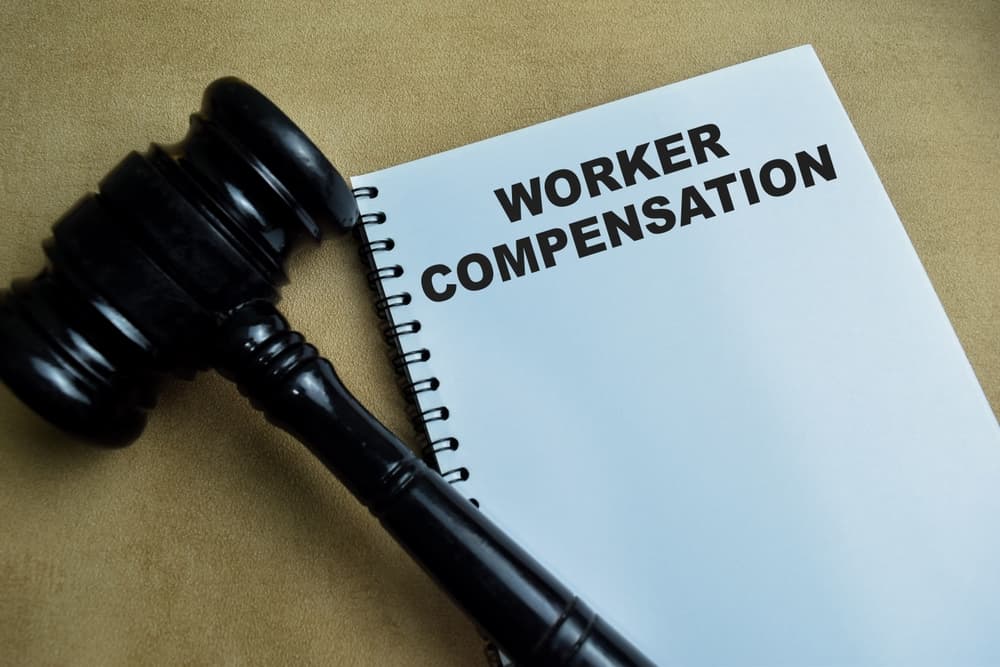How Long Can You Be on Workers’ Compensation?

When you’re injured on the job, it’s natural to feel overwhelmed and uncertain about your next steps. Navigating the workers’ compensation system can be daunting, especially when dealing with the physical and emotional toll of an injury.
At Klezmer Maudlin, we understand your concerns and are here to help you through this challenging time. Our Indianapolis workplace accident lawyers can tell you how long you can be on workers’ compensation in Indiana, the factors that influence the duration, and what you can expect throughout the process.
Schedule a Free Initial Consultation Today!
What Is Workers’ Compensation?
Workers’ compensation is a state-mandated insurance program that provides benefits to employees who suffer work-related injuries or illnesses. In Indiana, this system is designed to ensure injured workers receive the necessary medical treatment and financial support while they recover. It is intended to help workers get back on their feet and return to work as soon as possible.
How Long Do Workers’ Compensation Benefits Last?
The duration of workers’ compensation benefits in Indiana depends on several factors, including the severity of the injury, the type of benefits you are entitled to, and the timeline of your recovery. Here’s a breakdown of the different kinds of benefits and their respective durations:
Temporary Total Disability (TTD) Benefits
TTD benefits are paid when you cannot work due to your injury. These benefits continue until you reach Maximum Medical Improvement (MMI), which means your condition has stabilized, and further improvement is not expected. This duration can vary widely depending on the nature of your injury and your recovery progress.
Temporary Partial Disability (TPD) Benefits
You can get TPD benefits if you can return to work but cannot earn your pre-injury wages. These benefits continue until you reach MMI or until you can earn your pre-injury wages, whichever comes first.
Permanent Partial Impairment (PPI) Benefits
PPI benefits are paid if you have a permanent impairment that partially affects your ability to work. The duration is determined by the degree of impairment and is calculated based on a schedule provided by the state.
Permanent Total Disability (PTD) Benefits
PTD benefits are paid if your injury results in a permanent disability that prevents you from ever returning to work. These benefits can continue for the rest of your life.
Understanding Maximum Medical Improvement (MMI)
Maximum Medical Improvement (MMI) is a critical milestone in the workers’ compensation process. It signifies that your medical condition has reached a point where it is not expected to improve further, even with additional treatment.
In Indiana, the workers’ compensation insurance doctor will examine you to determine when you have reached MMI. This doctor is not the same as the Independent Medical Examiner (IME).
Independent Medical Examination (IME)

In Indiana, you can seek a second opinion if you disagree with the workers’ compensation insurance doctor’s assessment. This is known as an Independent Medical Examination (IME). Unlike many other states, the IME in Indiana is not the primary examination for determining MMI.
Instead, it serves as a second opinion and can be ordered by the workers’ compensation board judge or paid for by you, the injured worker. The workers’ compensation board, not your employer or the insurance company, appoints the doctor for the IME, ensuring a more independent and unbiased assessment.
Steps to Take If You Disagree with the MMI Determination
If you believe you have not reached MMI and need further treatment, you can request an IME.
Here’s what you need to do:
- Submit a Request: You or your attorney can request an IME from the workers’ compensation board.
- Board Review: The board will review your request and, if approved, appoint an independent doctor to conduct the examination.
- IME Examination: Attend the IME and ensure you provide all necessary medical records and information to the appointed doctor.
- Review the Results: Once the IME is complete, the workers’ compensation board will review the results and decide based on its findings.
Returning to Work After an On-the-Job Injury
One of the primary goals of the workers’ compensation system is to help you return to work. However, this process can vary depending on your condition and the type of work you do. Here are some potential scenarios:
- Full Recovery: If you fully recover and can return to your previous job without any restrictions, your workers’ compensation benefits will typically end when you return to work.
- Modified Duties: If you can work but with certain restrictions, your employer may offer you a modified or light-duty position. In this case, your TPD benefits may continue until you reach MMI or can earn your pre-injury wages.
- Permanent Restrictions: If your injury results in permanent restrictions that prevent you from performing your previous job, you may be eligible for PPI or PTD benefits, depending on the severity of your impairment.
Vocational Rehabilitation
Your injury may sometimes prevent you from returning to your previous occupation. When this happens, you may be eligible for vocational rehabilitation services. These services are designed to help you develop new skills and find suitable employment. The workers’ compensation system can provide support for vocational training, job placement assistance, and other resources to help you transition to a new career.
Impact of Workers’ Compensation on Future Employment
When you’re injured on the job and file a workers’ compensation claim, you may worry about how this might affect your future employment. Concerns about job security, potential accommodations, and the perception of future employers are valid and deserve careful consideration.
Job Security During and After a Workers’ Compensation Claim

In Indiana, it is illegal for employers to retaliate against employees for filing a workers’ compensation claim. This means you cannot be fired, demoted, or otherwise punished simply because you sought the benefits you are entitled to after a work-related injury.
Many employers have return-to-work policies that facilitate your transition back to your job after an injury. These policies might include modified duties or temporary assignments that accommodate your recovery. If your employer offers such accommodations, it can help you maintain job security while you heal.
While your employer cannot legally retaliate against you for filing a claim, some workers worry about the long-term implications. It’s important to maintain open communication with your employer and document any instances of potential discrimination or unfair treatment.
Future Job Prospects
Potential employers are generally not allowed to ask about your workers’ compensation history during the hiring process. However, gaps in employment or changes in job duties due to an injury might raise questions. Be prepared to address these inquiries honestly and positively, focusing on your abilities and readiness to contribute to a new role.
If asked about gaps in your employment, you can explain that you were recovering from an injury without going into specifics about the claim. You are not legally required to disclose your workers’ compensation claim to future employers.
Potential Workplace Accommodations
If your injury results in a permanent disability, you may be entitled to reasonable accommodations under the Americans with Disabilities Act (ADA). These accommodations can include modifications to your work environment, schedule adjustments, or assistive devices that enable you to perform your job duties effectively.
Proactively communicate with your current or potential employer about your needs and how specific accommodations can help you fulfill your role. Employers must engage in an interactive process to determine appropriate accommodations, ensuring you can continue to work productively.
Impact of Workers’ Compensation Duration on Employment
Short-Term vs. Long-Term Claims

The duration of your workers’ compensation claim can affect your employment situation differently. Short-term claims might have minimal impact, especially if you can return to work relatively quickly. Long-term claims, however, might lead to extended absences, which could complicate your employment status and necessitate more substantial accommodations or job modifications.
Regardless of the claim’s duration, maintain regular communication with your employer. Keeping them informed about your recovery progress and expected return-to-work date can help manage expectations and facilitate a smoother transition back to work.
Legal Protections for Long-Term Claims:
Even if your claim lasts for an extended period, you are still protected by anti-retaliation laws. If you encounter any issues related to job security or discrimination due to your prolonged absence, it’s important to consult with a workers’ compensation attorney to understand your rights and options.
Strategies for a Successful Transition Back to Work
- Focus on Rehabilitation and Recovery: Invest in your rehabilitation and recovery. Follow your medical treatment plan diligently and utilize vocational rehabilitation services if needed to regain your strength and skills.
- Update Your Skills: If your injury prevents you from returning to your previous job, consider updating your skills or exploring new career opportunities. Vocational training programs and educational resources can help you transition to a new field that accommodates your current abilities.
- Talk to a Workers’ Comp Lawyer: If you have concerns about how your workers’ compensation claim might impact your future employment, seek advice from a knowledgeable workers’ compensation attorney. They can help you navigate potential challenges and ensure your rights are protected.
Filing a workers’ compensation claim can raise concerns about future employment, job security, and necessary accommodations in the workplace. By understanding your rights and actively managing your recovery and return-to-work process, you can mitigate these concerns and maintain a positive career trajectory.
How a Workers’ Compensation Lawyer Can Help

Having a knowledgeable and experienced workers’ compensation lawyer by your side can make a significant difference in the outcome of your claim. Your lawyer can guide you through each step of the claims process, ensuring you understand your rights and options.
They can help you gather the necessary documentation, file your claim correctly, and meet all deadlines. This expert guidance can prevent common mistakes that might otherwise delay or jeopardize your benefits.
Your attorney will advocate for your best interests, whether negotiating with insurance companies, attending hearings, or appealing denied claims. They will work tirelessly to ensure you receive the maximum benefits you are entitled to, including proper medical treatment and fair compensation for lost wages.
An experienced lawyer will have a network of medical professionals who can provide independent evaluations and expert testimony to support your claim. They can help ensure your medical conditions are thoroughly documented and accurately presented.
If your claim is disputed or denied, a workers’ comp attorney can represent you in appeals and hearings before the workers’ compensation board. They can present evidence, question witnesses, and make legal arguments on your behalf to improve your chances of a favorable outcome.
Frequently Asked Questions About Workers’ Compensation Duration
How long can I receive TTD benefits?
TTD benefits continue until you reach MMI. There is no set time limit, as it depends on your recovery progress.
Can my employer terminate my benefits before I reach MMI?
Generally, your employer cannot terminate your benefits before you reach MMI. However, if you can return to work in a modified capacity, your TTD benefits may be adjusted to TPD benefits.
What if I disagree with the MMI determination?
You have the right to request an IME if you disagree with the MMI determination made by the workers’ compensation insurance doctor.
How are PPI benefits calculated?
PPI benefits are calculated based on the degree of your impairment and are determined according to a schedule provided by the state.
Can I receive PTD benefits for life?
Yes, if you are permanently and totally disabled as a result of your work-related injury, you may receive PTD benefits for the rest of your life.
Work With Klezmer Maudlin PC to Navigate Workers’ Compensation with Confidence
Navigating the workers’ compensation system in Indiana can be complex, but understanding your rights and the duration of benefits available to you can help provide peace of mind. At Klezmer Maudlin, we are dedicated to helping you through every step of the process.
Our experienced workers’ compensation attorneys can review your workplace injury and explain your rights. We make your recovery and well-being our top priorities, and we are here to support you as you work toward getting back to work.
Remember, you are not alone. The legal team at Klezmer Maudlin PC is here to guide you through the process and ensure you receive the benefits you deserve. Call our Indianapolis office at (317) 569-9644 or contact us online at any time for a free consultation.

